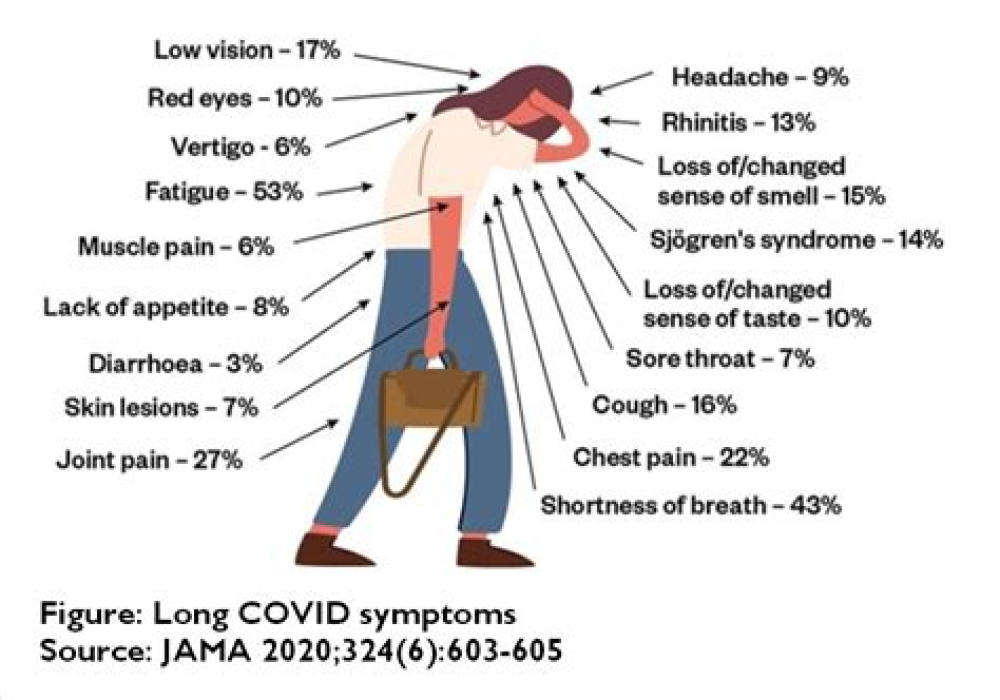Authors: Harry Crook, research assistant1, Sanara Raza, research assistant1, Joseph Nowell, research assistant1, Megan Young, clinical research officer1, Paul Edison, clinical senior lecturer, honorary professor12
Abstract
Since its emergence in Wuhan, China, covid-19 has spread and had a profound effect on the lives and health of people around the globe. As of 4 July 2021, more than 183 million confirmed cases of covid-19 had been recorded worldwide, and 3.97 million deaths. Recent evidence has shown that a range of persistent symptoms can remain long after the acute SARS-CoV-2 infection, and this condition is now coined long covid by recognized research institutes. Studies have shown that long covid can affect the whole spectrum of people with covid-19, from those with very mild acute disease to the most severe forms. Like acute covid-19, long covid can involve multiple organs and can affect many systems including, but not limited to, the respiratory, cardiovascular, neurological, gastrointestinal, and musculoskeletal systems. The symptoms of long covid include fatigue, dyspnea, cardiac abnormalities, cognitive impairment, sleep disturbances, symptoms of post-traumatic stress disorder, muscle pain, concentration problems, and headache. This review summarizes studies of the long term effects of covid-19 in hospitalized and non-hospitalized patients and describes the persistent symptoms they endure. Risk factors for acute covid-19 and long covid and possible therapeutic options are also discussed.
Introduction
Coronavirus disease 2019 (covid-19) has spread across the world. As of 4 July 2021, more than 183 million confirmed cases of covid-19 have been recorded worldwide, and more than 3.97 million deaths have been reported by the World Health Organization .1 The clinical spectrum of covid-19 ranges from asymptomatic infection to fatal disease.23 The virus responsible for causing covid-19, severe acute respiratory syndrome coronavirus 2 (SARS-CoV-2), enters cells via the angiotensin-converting enzyme 2 (ACE2) receptor.4 Once internalized, the virus undergoes replication and maturation, provoking an inflammatory response that involves the activation and infiltration of immune cells by various cytokines in some patients.5 The ACE2 receptor is present in numerous cell types throughout the human body, including in the oral and nasal mucosa, lungs, heart, gastrointestinal tract, liver, kidneys, spleen, brain, and arterial and venous endothelial cells, highlighting how SARS-CoV-2 can cause damage to multiple organs.67
The impact of covid-19 thus far has been unparalleled, and long term symptoms could have a further devastating effect.8 Recent evidence shows that a range of symptoms can remain after the clearance of the acute infection in many people who have had covid-19, and this condition is known as long covid. The National Institute for Health and Care Excellence (NICE) defines long covid as the symptoms that continue or develop after acute covid-19 infection and which cannot be explained by an alternative diagnosis. This term includes ongoing symptomatic covid-19, from four to 12 weeks post-infection, and post-covid-19 syndrome, beyond 12 weeks post-infection.9 Conversely, The National Institutes of Health (NIH) uses the US Centers for Disease Control and Prevention (CDC) definition of long covid, which describes the condition as sequelae that extend beyond four weeks after initial infection.10 People with long covid exhibit involvement and impairment in the structure and function of multiple organs.11121314 Numerous symptoms of long covid have been reported and attributed to various organs, an overview of which can be seen in fig 1. Long term symptoms following covid-19 have been observed across the spectrum of disease severity. This review examines the long term impact of symptoms reported following covid-19 infection and discusses the current epidemiological understanding of long covid, the risk factors that may predispose a person to develop the condition, and the treatment and management guidelines aimed at treating it.

Multi-organ complications of covid-19 and long covid. The SARS-CoV-2 virus gains entry into the cells of multiple organs via the ACE2 receptor. Once these cells have been invaded, the virus can cause a multitude of damage ultimately leading to numerous persistent symptoms, some of which are outlined here.
For More Information: https://www.bmj.com/content/374/bmj.n1648
